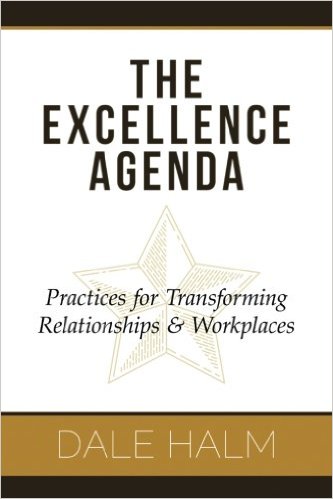Excellence Agenda
Practices for Transforming Relationships & Workplaces
Are you creating excellence in your relationships, in your workplace? This book will forever change how you approach working with others. In The Excellence Agenda, Dale Halm author and renowned business consultant, explores what it takes to truly excel. It reveals the mindset and behaviors needed for optimal performance. By offering a series of thought-provoking questions, this book provides a powerful roadmap for success. It includes:
- The Success Paradigm – alternative ways of thinking that foster collaboration
- Breakthrough Practices – crucial behaviors that lead to exceptional results
- Tools – guidelines for mastering the skills of excellence
- Excellence Survey – 20 questions to help you assess your ability to excel
The Excellence Agenda will inspire you to transform your relationships and workplace.
Featured Posts
March 24, 2022 | Dale Halm
Excellence – It's About Practice and Choice
A practice is something you do or the way you think. Practice means to perform an activity repeatedly in order to improve or maintain one's proficiency. Aristotle captured this notion perfectly when he said, "We are what we repeatedly do − excellence, therefore, is not an act, but a habit."
Practices are the tools you use to achieve excellence. Examples of practices I believe lead to excellence include: managing assumptions, being adaptable, and being aware of your personal impact. The only way to become proficient is to use them again and again − excellence demands persistence. You learn from your mistakes and experience in order to determine what you need to do differently. Then you adjust your thinking and modify your behavior. This is how you learn − this is how you grow.
Most people want the quick fix. I can promise you that approach won't work. Achieving excellence is a discipline. Mastery of excellence is not the ability to always think and act differently or never slip-up. It is not about being perfect. The more you try to be perfect, the more likely you will give up.
Gaining mastery in achieving excellence is about being aware of your thinking and behavior. It is making real time choices and adjustments that allow you to be more effective. Experts in human behavior such as sports psychologists, executive coaches, and behavioral scientists, emphasize that personal success is linked to two things. First, it is our ability to be truly present in the moment. Second, is that we take accountability for how we relate to ourselves and interact with others.
All practices are based on choice. You choose your thoughts and actions. Given any situation, you can react as usual or differently, depending on the choices you make. Viktor E. Frankl, the famous Austrian psychiatrist and Holocaust survivor, is recognized as one of the world's greatest thinkers. In his book, Man's Search for Meaning, he notes, "Between stimulus and response there is a space. In that space is our power to choose our response. In our response lies our growth and freedom." This powerful insight captures the important role that choice plays in realizing excellence − it is a hallmark for success.
Here is a simple 4-step process that expands Viktor E. Frankl’s powerful insight. Think of it as a road sign on your journey to excellence. It reminds you to slow down your thinking and be more intentional about how you respond to trying circumstances.
First, be aware. Before you can become more effective, you must initially be cognizant of what is really happening around you. Second, think openly. Now that you are more attentive to what is actually occurring, the potential exists to think in a clearer, more open manner. Rather than being judgmental or simply reacting to what has happened, you can think more objectively. Third, choose wisely. By considering alternatives, you can create options for how to respond to difficult conditions − you become more discerning. Fourth, take action. By tuning into your thought process, your actions become more powerful and effective. Refer to this road sign often to help you monitor your performance.
When you identify practices that you think will lead you toward excellence, when you realize the power that choice plays in striving for excellence, it boils down to these four questions.
- Am I aware of my reactions?
- How am I interpreting my experience?
- What choices will I make?
- What actions will I take?
What practices will you model daily to achieve excellence? What choices will you make?

